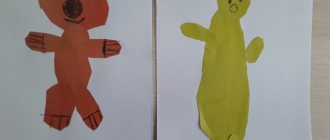For a small child, the world of sounds and coherent speech is very complex, so adults should help him in every possible way in the development of speech. But sometimes children do not master pronunciation, and their speech becomes incoherent and incomprehensible. This disrupts not only communication with the child, but also his further education, upbringing and development. Even if he does not have general developmental disorders, such a child will experience serious difficulties in learning, as well as psychological difficulties in communicating with peers and teaching staff. The feeling of one's own imperfection can lead to problems in the socialization and adaptation of children with speech defects, cause isolation, and in the future lead to even more serious complications in life. To prevent this from happening, the activities of a professional speech therapist and speech therapy work carried out by a kindergarten teacher are of great importance.
Their responsibilities are different. A speech therapist is a professional who sets the direction of activity, assigns pronunciation to children, develops and trains the speech apparatus so that the child can pronounce sounds that were previously absent in his speech or those that he pronounced with errors. The work of a teacher in the speech therapy group of a kindergarten, in general terms, is to support the work of the speech therapist, consolidate the acquired knowledge and skills in children, help them master complex sounds, and do this not from time to time, but on an ongoing basis. This means that the central place in the work on correcting speech disorders belongs to a speech therapist, and the teacher supports his activities in every possible way and helps children learn new knowledge and skills more easily and quickly.
The experience of working as a speech therapy group teacher is of great importance for children. A good specialist knows the specifics of his work very well, knows how to get along with children with special needs, cooperates competently with a speech therapist and helps students correct existing speech disorders faster and more productively.
Key responsibilities of a teacher
When working with children with speech disorders, the teacher is obliged to take measures to increase the vocabulary of preschoolers, eliminate agrammatisms, deficiencies in phoneme formation and incorrect pronunciation. Therefore, such pedagogical activities have unique features. Taking them into account, teachers and doctors effectively eliminate speech deficiencies, help children learn and integrate into society.
The key to success is coordinated correctional work in speech therapy groups. The teacher must examine each child immediately after joining the team and carefully study the medical recommendations. A thematic annual work plan is jointly drawn up, taking into account the age, knowledge and capabilities of the children.
A speech therapist corrects and improves speech communication. The responsibilities of the teacher include:
- control of children’s speech during classes and rest for effective mastery of it;
- performing speech therapy exercises, explaining them to parents - so that children expand their vocabulary and actively use it, reinforce correct sound pronunciation, develop fine and articulatory motor skills;
- conducting classes and organizing leisure time, taking into account parallel and individualized education for children;
- creation of psychologically comfortable conditions in the group for better speech formation and elimination of speech dysfunction in students.
Difficulties of working as a speech therapy group teacher
In order to most effectively plan and apply correctional work in the field of speech pathology in children, the teacher must understand the features of psychological processes associated with speech disorders:
- Problems with memory, attention, and the ability to concentrate on solving a specific problem.
- Disorders of articulatory and finger motor skills.
- Incomplete formation of verbal and logical thinking.
Since children with speech pathologies also have other deviations or developmental delays, this may manifest itself as follows:
- Students cannot reproduce the order of objects if they are rearranged. Sometimes children cannot cope with the sequence of arrangement of even 3-4 objects.
- Unable to find inconsistencies in paired drawings.
- Items that need to be sorted according to a certain criterion are not fully identified, for example, putting aside things made of wood, paper, fabric, and so on.
Such children are disinhibited, they cannot concentrate on one action or object for more than a few minutes, and they get tired very quickly, so a teacher in a group for students with speech disorders will need to visually reinforce their actions. He will also have to use simpler speech structures, explain his actions as briefly and clearly as possible for children of the appropriate age and level of knowledge, and give them rest between exercises. Children with such features remember everything much more easily at an involuntary level than at a voluntary level, so all activities need to be structured in a light playful way in order to interest children in what is happening.
Problems with articulatory motor skills are manifested in the physical limitation of movements of parts of the speech apparatus: tongue, lips, soft palate, lower jaw, therefore, on the advice of a speech therapist, classes on the development of these parts of the body in the form of special speech gymnastics should be included in the work hours of the teacher in the speech therapy group.
Speech disorders are often combined with other developmental problems, for example, they are associated with underdevelopment of fine motor skills. That is why experienced specialists insist that the development of motor skills be stimulated in every possible way in children with similar problems. Such children have constrained movements, do not know how to lace their own shoes or fasten the buttons on their own clothes, hold cutlery not with their fingers, but clasp it in their fist, and also take other utensils, for example, they cannot use drawing brushes, pencils and felt-tip pens correctly.
Pupils with speech underdevelopment have indicators of general development below their age norm. The difference is not too noticeable, but it will worsen as children grow older, unless correct and systematic correction is applied. In order for a child to develop correctly, he definitely needs to develop speech and correct all its violations. To do this, the teacher will have to demonstrate not only his educational abilities and professional knowledge, but also purely human positive qualities.
In speech therapy groups there are children with different behavior and psychological characteristics. Some of them quickly become distracted, begin to get bored, not pay attention to what is happening, fidget, or sit apathetically in a corner. Others show signs of irritation and aggression and react painfully to the teacher’s comments. So, in order to find an individual approach to each child, the teacher will take a lot of effort, time and patience, and will need all possible tolerance and endurance. To work with such groups, you need to really love children and care about their well-being.
The working week according to the work schedule of a speech therapy group teacher, due to the high workload on the employee, is a total of 25 hours, that is, 5 hours a day for a five-day week. If the teacher overworks, his rate is recalculated and an additional 20% is paid for working with the speech therapy group.
Effective speech development
When working, a teacher of speech therapy groups on the speech development of preschool children must use all types of communication - initiated by adults and spontaneous. You need to ask each child questions, not stop him when he wants to speak, and encourage initiative in conversation. In order for children to master speech faster, the teacher must:
- listen to children’s conversations and be able to identify deficiencies in phonetics and grammar in speech;
- engage in the education of pupils continuously, taking into account the lexical topics given by the speech therapist - in this case, the teacher’s speech should be intelligible, with expressive intonations and emphasized articulation;
- provide a cognitive base - study various topics with children so that children master the minimum vocabulary and learn everything they need for impressive and expressive speech;
- stimulate interest in the conversation, involve students in it, maintain a conversation not only in class, but also on walks, games, and during quiet rest.
A clear example of the specifics of a teacher’s work is the coordination of numerals with nouns. The speech therapist introduces the pupils to speech forms, and the teachers do exercises - how to use the adverbs “little” and “many” with numerals, how to use the genitive, accusative case, etc.
Teaching methods
1. We have developed an educational program for speech therapy group teachers so that training is easy without loss of quality. And the students underwent professional retraining to the end, and did not give up halfway due to the huge amount of information and difficult tasks. They could combine training with work or parallel education.
- The course is concise, but high quality. Teachers selected the most important information for lectures and webinars, based on the requirements of professional standards, Federal State Educational Standards, and personal work experience. Theoretical materials are presented in clear language, in a concentrated form, without “water” and lyrical digressions off topic.
- You can complete practical assignments, take tests and assessments at a convenient time within the study schedule.
- We help students not to be afraid of tests, tests, exams. For example, we give 3 attempts to pass the final interdisciplinary exam. Tests in intermediate modules and disciplines can be taken an unlimited number of times.
2. Students receive access to the distance learning system (DLS). During the course, they get acquainted with educational materials and complete tasks loaded into the LMS. Pass intermediate testing and final certification.
3. We use several types of content for theoretical training in professional retraining programs.
- Course materials – manuals, lectures on the program. The texts of educational materials are loaded into the LMS in the form of word files. It is convenient to work with them: copy or highlight the necessary information, download, print.
- Webinar library. Each webinar is dedicated to one topic.
4. Practical training of students is based on the study of typical working moments. We give creative tasks and teach how to draw up lesson plans that will be useful in the field.
Carrying out speech therapist tasks
The most important part of a teacher’s work is reinforcing the skills that a speech therapist instills in children. To correct deviations, “five-minute speech therapy sessions,” games, and exercises are used. The format is chosen depending on the schedule of classes and other activities of the children.
“Five-minute lessons” are short, emotionally pleasing training sessions for children that correspond to the lexical topic that the speech therapist has planned to study. They help develop all components of speech and consolidate specific skills. After lunch, to fill the pauses, it is recommended to use game exercises, specially developed by a speech therapist.
Before lunch and after bedtime, it is necessary to pay individual attention to each child. It is important to organize work in parallel - one student, for example, studies personally, while others rest under the supervision of a junior specialist. 10-15 minutes are allotted for individual exercises with the child. These classes are regularly attended by a speech therapist to monitor the results and make corrections if necessary.
To consolidate the acquired speech skill, the teacher offers children articulation gymnastics and gives them speech therapy exercises for:
- coordination of movements with speech;
- consolidation and differentiation of correctly pronounced sounds;
- staging speech breathing;
- development of the ability to remember, attentiveness, phonemic hearing, fine motor skills;
- developing the skill of writing descriptions (using mnemonic tables).
Creating a motivating atmosphere in the group
In order for children to believe in themselves and their capabilities, the atmosphere in the group should be as friendly as possible. The duty of the teacher is to eliminate negative emotions associated with speech dysfunction, to develop motivation for work and interest in work in each child. To create the correct psychological “background” you need:
- develop behavioral skills in children in a preschool group;
- notice and respond in a timely manner to manifestations of aggression, passivity, and conflicts;
- develop in children normal ethical and moral ideas about life and interaction with people;
- encourage initiative and good behavior.
You can obtain the profession of a teacher working with children with speech therapy disorders at the ANPOO "NSPK". For admission you do not need to pass the Unified State Exam, there are no entrance exams. Training is conducted remotely*, under an official educational license. The graduate will receive two diplomas at once - about secondary vocational education and professional retraining - and his value in the labor market will be high. Information about admission and promotions for applicants can be obtained from the admissions committee of the ANPOO "NSPK".
* Form of study – correspondence. Educational programs are implemented using e-learning and distance learning technologies.
Learning outcome
- You receive the theoretical knowledge and practical tools necessary to successfully perform the job duties of a logo group teacher.
- Upon completion of training, the registration data of the issued documents is entered into the Federal Information System “Federal Register of Information on Educational Documents and (or) Qualifications, Training Documents.”
- You can work in private and public kindergartens.







